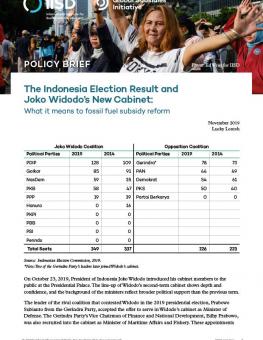
The Indonesia Election Result and Joko Widodo’s New Cabinet: What it means to fossil fuel subsidy reform
Indonesia's President Joko Widodo has chosen a new cabinet to help deliver his legacy in his final term, there are big tasks ahead regarding fossil fuel subsidies and renewable energy expansion.
Key Messages
- The lineup of President Widodo’s second-term cabinet shows depth and confidence. The support of political groups that is reflected in the background of the ministers is broader than the previous term.
- In Widodo’s first term, the development of renewable energy in Indonesia was overshadowed by the expansion of coal power plants (in the electricity sector),
- Indonesia's Low Carbon Development Initiative (LCDI) will be the tool guiding the new cabinet as it attempts to integrate the country’s economic priorities with its sustainability agenda in 2020 and beyond.
On October 23, 2019, Indonesian President Joko Widodo introduced his cabinet members to the public at the Presidential Palace. The lineup of Widodo’s second-term cabinet shows depth and confidence. The support of political groups that is reflected in the background of the ministers is broader than the previous term. The question is how this new cabinet will help the President deliver on his legacy, including attempts to reform fossil fuel subsidies and increase renewable energy usage.
Participating experts
You might also be interested in
Switching Fossil Fuel Subsidies in Indonesia to Support a Green Recovery
This brief looks at how Indonesia can start actively promoting renewable energy by removing the existing hurdles to its deployment—such as unattractive renewable energy feed-in tariffs and land and infrastructures barriers—and switching public support from fossil fuels to renewables to meet the country’s clean energy targets.
Indonesia's fiscal support for fossil fuels too large: IISD
The Indonesian government's fiscal support for fossil fuels is still too large, so it has the potential to slow down the energy transition and drain the public budget, according to the International Institute for Sustainable Development (IISD).
At long last, Canada restricts oil and gas subsidies (except for all the loopholes)
Environment and Climate Minister Steven Guilbeault has unveiled detailed plans to phase out "inefficient" oil and gas subsidies, based on guidelines released yesterday morning that take effect immediately and are meant to fulfill a 14-year-old pledge by G20 countries.
Heatwaves to hit China once every 5 years as global extreme weather events multiply, study finds
Record-breaking heatwaves that have scorched North America, Europe and China are set to worsen in future unless the world stops burning fossil fuels, according to a study by the World Weather Attribution (WWA) academic initiative.